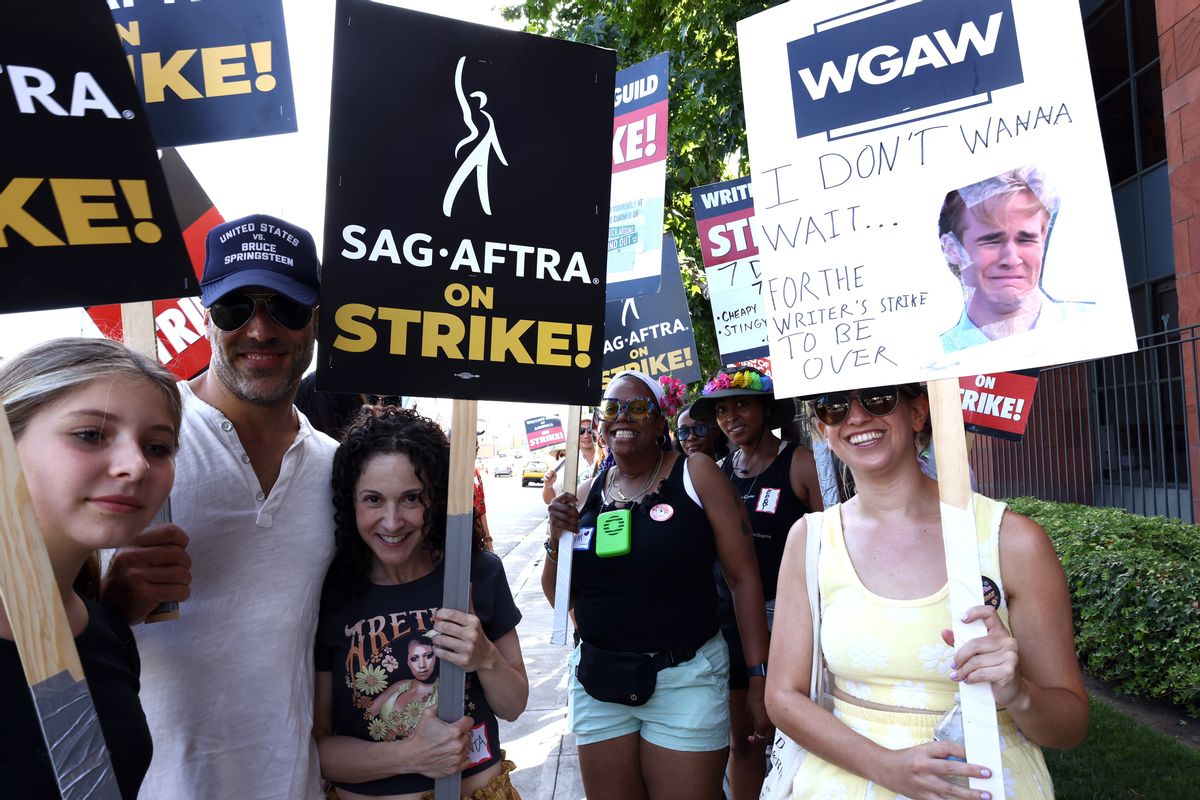On July 13, 2023, the Screen Actors Guild and American Federation of Television and Radio Artists (SAG-AFTRA), the union representing Hollywood actors and performers, voted to go on strike against major studios after contract negotiations broke down. They joined the Writers Guild of America (WGA), the union representing screenwriters who had been picketing since May 2023. This was the first joint strike of writers and actors since 1960.
Director and screenwriter Boots Riley noted on Twitter, "The last time actors and writers were on strike together, in 1960, is how we got health care, pension, and residuals on broadcast film. That didn't exist in the film and TV industry until then. A lot is possible with this kind of solidarity and this is the perfect time for it."
The last time actors and writers were on strike together, in 1960-
is how we got health care, pension, and residuals on broadcast film.
That didnt exist in the film and TV industry until then.
A lot is possible with this kind of solidarity and this is the perfect time for it.
— Boots Riley (@BootsRiley) July 19, 2023
Riley is correct that the 1960 joint writers and actors strike resulted in healthcare, pensions, and access to residuals that resulted from films being shown on television.
We should note, however, that each union achieved similar goals within different timeframes and negotiated separate contracts for film and television work. At the time, the Association of Motion Picture Producers represented the bigger studios and production houses for film contracts, while the Alliance of Television Film Producers handled small-screen contracts. Today, all union contracts go through the Alliance of Motion Picture and Television Producers.
In 1960, the writers began striking in January and the actors followed in March. The WGA was on strike for 153 days, according to the Associated Press, and the actor's union— then just SAG — was on strike for 43 days.
Residuals were at the heart of both of the guilds' demands, with the advent of television resulting in writers and actors wanting bigger cuts of the revenue from films sold to television, as well as better health benefits and pensions. Writers demanded studios contribute money to the WGA health and pension funds, as well as increased wages and residuals related to their work being shown on television, or via television reruns. Actors had similar demands, striking primarily over residuals from films sold to television networks.
In the 1950s, the WGA and the Directors Guild of America (DGA) had secured through various contract battles some pension and healthcare plans for workers, something SAG wanted to establish, as well. However, the 1960 strike resulted in the establishment of the WGA's first independent pension fund and participation in an industry-wide health insurance plan. According to the WGA website, gains also included "the first residuals for theatrical motion pictures, paying 1.2% of the license fee when features were licensed to television."
SAG—led by Ronald Reagan before he went into politics— secured studio money that allowed for the formal establishment of pension, health and welfare funds. This victory took place just before the WGA and DGA opened the doors for members to join their hard-fought pension and healthcare benefits plan on March 31, 1960.
The studios, however, did not budge on SAG's demands that their actors receive 2% of the revenue from post-1948 film sales to television. They did, however, agree to a royalty-payment system for television-licensing revenue for films produced after Jan. 31, 1960. According to Variety, the studios agreed to contribute an extra 5% of all film and television salaries into the health and pension fund. Additionally, in what seemed to be an exchange for not getting a cut of the post-1948 movie-to-television revenues, the studios gave another $2.6 million in total payments to SAG, to recognize seasoned actors' "past service" to the industry. This amount was used to create SAG's pension and welfare plan, according to its website.
Not everyone was happy with the agreements, with many actors grumbling that Reagan folded too quickly and that they could have retroactively received payments for pre-1960 films.
The 1960 action was the first of its kind, where two key groups went on a strike in an industry where unions had major divisions. According to a Washington Post analysis of the 1960 strike by film and television experts Miranda Banks and Kate Fortmueller, workers in physical production resented the strike, as they were hurt by film shutdowns. Disunity within the guilds also led to concessions, in which writers and actors had to forgo their backpay for past films to ensure future earnings.
They observed that even as guilds faced disagreements within their ranks, the 1960 battle "foreshadowed how the unions for writers and actors eventually would become reliable allies, recognizing the necessity of unity as studios and networks became branches of media conglomerates starting in the 1980s."
It can be argued that joint striking led to historic gains for workers in the industry. The 1960 actors and writers strike did indeed result in access to residuals from films broadcast on television, health and pension benefits. We thus rate this claim as "True."

